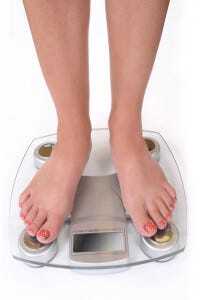Diet Sabotages Exercise Benefits Worse Than Thought

It may seem natural to think getting active is the key to shedding pounds and getting healthier. However, the truth is that to achieve better health, you need to put your plates before the weights. (Get it?). Making matters worse in the relationship between exercise and weight loss, new research shows the well-known equation of burning 3,500 calories = to 1lb lost may be way off- you need to burn closer to 7,000 calories.
>Check the Body Weight Planner Calculator on USDA.gov developed by the National Institutes of Health to see how you fare using these updated equations.
Even so, this exercise vs. intake thinking seems rational enough: eat whatever you want and work it off by sweating in the gym. Though we hate to break it those spending hours a week sweating it out, more and more studies are showing it simply isn't true. To live healthier, a nutritious diet is the most important building block. In fact, some researchers have established the 80/20 rule for healthy living. 80 percent of your attention should be focused on diet, the other 20 on exercise.
The good news is if you’re on either side of the equation—exercising, but maintaining a poor diet or eat well and not exercising—a few tips can help you get to where you want (and need) to be.

Body Movin’, No Pounds Losin’
Let’s start with the active group. You love getting active, but feel that entitles you to down unhealthy fuel for your body. Given your commitment to exercise, it’s obvious you can make healthful changes and more importantly stick to them. Now it’s time to turn that attention to your meals.
Plain and simple, it is just easier to cut calories from your diet than it is to burn them off on a treadmill. Try these tips to help make nutritious diet choices:
- Take a look at portions. If you’re heaping on first and second helpings during lunch and dinner, then you have ample opportunity to reduce your caloric intake. Try using smaller plates or bowls to trick your mind into thinking you’re still getting a large serving while cutting out calories. Many try portion controlled and protein-rich meal entrees or breakfasts to keep the same meal experience, but feeling full while eating less.
- More than cardio. If your primary exercise goal is weight loss, think about significantly increasing your strength training to get more return for your time spent working out.
- Start small. Overhauling your diet will not be easy. And if you try to do a quick 180, chances are you will be unsuccessful. Start small and focus on making healthier choices little by little. Have a salad for lunch one day a week and gradually increase the frequency.
- Make smart swaps. Everyone loves candy bars and sweets. Unfortunately, they rarely jive with a well-balanced diet. To overcome this hurdle, look to meal replacement protein bars or meal replacement protein shakes & drinks. These items are sweet and pack a healthful punch. Snag one on the go for a quick breakfast or lunch and you’ll be on your way to a slimmer, trimmer look.

Healthy Eats, Too Many Seats
Now, let’s take a look at the other side of the coin. You love eating well, but HATE to exercise. You likely already know that you should be working out, but the thought of gym clothes and running shoes makes you miserable. Give these tips a shot to help you get up and get active.
- Avoid the “workout.” Getting active doesn’t require a gym membership or attending classes. If you work in an office building, take the stairs. Or the next time you go out for dinner pick somewhere within walking distance. Read more on mastering the "at-work workout."
- Reward yourself. Regular exercise requires commitment. Put together an exercise plan for yourself and set milestones. Gradually increase the time you put in and reward yourself with a cheat day on your diet.
- Move from daily to weekly tracking. By tracking calories and activity on a weekly basis, you'll avoid those frequent, spontaneous eating decisions stemming from adding up your exercise in your head and cashing it in on food.
- Keep trucking. Most importantly, do not give up. Lifestyle changes are hard. That’s why so many people struggle making them. When you need support, reach out to family, friends or even your physician for the inspiration to keep going!